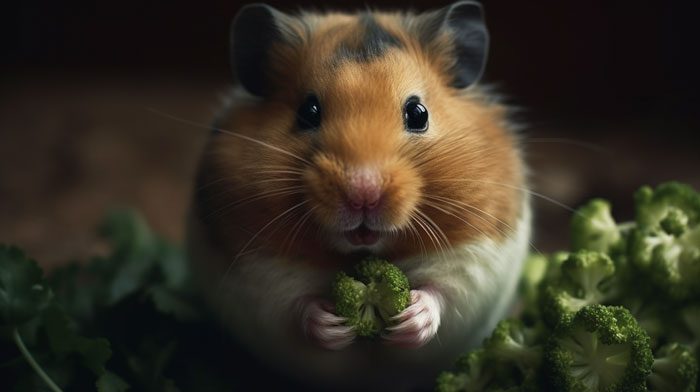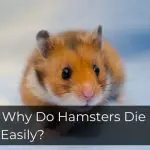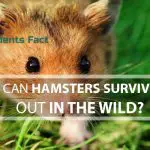What Veggies Can Hamsters Eat?
Vegetables are an essential part of your hamsters’ diet! However, not all veggies are ideal for their sensitive body and immune system.
So, what veggies can hamsters eat, then? Carrots, spinach, broccoli, cucumber, and radishes are some of the veggies your hamsters can eat. Most of these vegetables come with all the necessary vitamins (like A and C) and antioxidants, which can benefit your hamsters.
But make sure to keep the amounts in check so that it doesn’t cause any adverse health issues. Want to know more in detail? Then this article is a must-to-read for you!
The Veggies That Are Perfect for Your Hamsters
When it’s about veggies, there are certain types that your hamsters would surely love to have them. Here’s a list of the veggie types you can consider for your fluffy hamsters.

Carrots
Carrots are considered to be quite a healthy diet for hamsters as they are rich in vitamins, minerals, and fiber. These veggies are packed with vitamins A and C, essential for hamsters’ good eyesight and support their immune system.
That’s not all; carrots are even pretty low in calories and fat, ensuring a healthy diet for hamsters to maintain proper body weight.

Note: Carrots are, without question, high in sugar, so you should only provide your hamsters in small quantities to prevent health problems (like diabetes) and obesity. Also, make sure you chop them off in small pieces to avoid your hamster choking.
Spinach
Spinach is a perfect example of a leafy green vegetable high in calcium, iron, and vitamins A and C. Moreover, it’s an astounding nutrition source for hamsters.
But you must implement it in their diet in small amounts as spinach is high in oxalate. If given in excess, it can interfere with the hamsters’ calcium absorption and can lead to certain health problems.

So, adding a small amount should be a great way to add some delicious treats to your hamster’s diet.
Broccoli
As you all know, broccoli’s a highly nutritious vegetable rich in fiber, vitamin C, and antioxidants. And you should be amazed to know that hamsters can benefit greatly from their nutrients!
But as mentioned earlier, the quantity needs to be checked, as an excessive amount can result in bloating and gas. That’s not all; excessive amounts can even lead your hamster to digestive issues and other discomforts.

Cucumber
Cucumber is one of the hydrating and refreshing vegetables for your hamsters that’s high in fiber and water content. It’s also considered an astounding hamster’s diet, as it aids them with digestive problems and keeps them super-hydrated.
Another plus point with this veggie is that it’s low in sugar and calories, ensuring your hamsters stay in a healthy diet check!

Cauliflower
Cauliflower is another vegetable that hamsters love! It’s rich in vitamin C, antioxidants, and fiber. And without question, hamsters can take a lot of positives from their nutrients.
However, remember that cauliflower should only be offered in small amounts, as too much of it can result in bloating and gas in your hamsters.
Radishes
Radishes are flavorful and crunchy vegetables that are high in vitamin C and fiber. Moreover, they are low in sugar and calories, ensuring that it’s a healthy snack option for your fluffy hamsters.
Remember, too much of it can cause your hamsters to suffer from bloating and gas issues!

Sweet Potato
It’s a starchy vegetable rich in potassium, fiber, and vitamins A and C. Sweet potato is also considered a pretty remarkable energy source for hamsters, but it’s always recommended to keep the quantities small as these are high in sugar.
So, giving too much of this veggie can result in health issues and even a rise in the weight of your hamsters.
Asparagus
When you’re looking for a veggie-rich in antioxidants, Asparagus is the jack of all trades! It is not just antioxidants; it even comes with essential vitamins (like vitamins A and C). And moderate amounts can help your hamster maintain healthy digestion and weight.

Note: Too much of these veggies can result in gas and bloating issues within your hamster!
What Shouldn’t You Feed Your Hamsters?
Here we’ve shortlisted some of the veggies and fruits that are a big no-no for the diet of your hamsters. So, make sure to read till the end!
Citrus fruit
Citrus fruits, like oranges, grapefruits, and lemons, are comparatively too acidic for your hamsters, and this can result in digestive issues, mouth sores, and different other health complications. So, it’s a must that you keep such fruits away from their diets!

Onions
If you don’t know, onions have thiosulphate in them, which can adversely affect your hamster’s red blood cells and cause anemia.
And this can, in turn, lead your hamsters to be lethargic and weak. So, if you want to see your hamsters super-active and fit, ensure you don’t include onions in their diet!
Garlic
Garlic is another big no-no for your hamsters! It contains compounds like disulfide and thiosulphate that can be super toxic for your hamsters.
Consuming garlic can seriously damage the red blood cells of your hamsters and can even result in a condition called Heinz anemia! Plus, your hamsters can suffer from severe loss of appetite, making them weak and even resulting in death.
Raw Potatoes
Raw potatoes come with solanine, a toxic compound that can result in your hamsters having digestive issues and other serious problems that even result in death.
However, your hamsters can be safe from mishaps if it’s cooked potatoes! The reason is that most of the solanine gets lost during cooking, so there’s less chance for the toxic compound to enter inside the hamsters.

Eggplant
Eggplant also comes with certain toxic compounds like oxalic acid that can cause severe digestive issues within hamsters.
Moreover, your hamsters can also suffer from kidney-related issues if eggplant gets included in their diet. So, it’s always recommended to avoid feeding eggplant to your hamsters!
If you’re a hamster owner, you might be wondering about if hamsters can fart or if they can live with guinea pigs. At RodentsFact, we have articles on do hamsters fart and can hamsters and guinea pigs live together. Our article on do hamsters fart explores the digestive system of hamsters and the likelihood of flatulence, while our article on can hamsters and guinea pigs live together explores the compatibility and safety issues of keeping these two rodents in the same habitat. By learning about these aspects of hamster care, you can provide the best living conditions for your pet.FAQs
If you still have some further askings left, have your eyes here.
Q: Is it okay if hamsters eat veggies every day?
Yes, it’s fine as long as you keep the proportions in check! Your hamsters will love to eat more veggies and fruits. But too much of this food can degrade their health.
Q: Is the tomato a good food choice for hamsters?
Yes, it is. But expert vets recommend that you only serve half a spoon of tomatoes at max and only once a week. So, you can say it should be more of a treat to your hamsters rather than a regular diet!
Q: Can you feed almonds to your hamsters?
Yep! Almonds are pretty loved treats for hamsters. But make sure you’re serving sweet almonds rather than bitter ones. Bitter almonds have cyanide compounds that can prove fatal for your hamsters.
Bottom Line
So, after going through this blog, you should now know what veggies can hamsters eat! Next time when you feed your hamsters, ensure to implement the mentioned vegetables in their diet.
But remember to serve them in moderate amounts, and if you face trouble with them, consult an expert vet for the right diet plan! Besides, keep an eye on their health and daily routine. A regular check-up with a vet is also essential for the healthy lifestyle of your pets.




